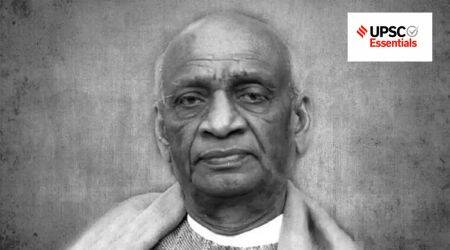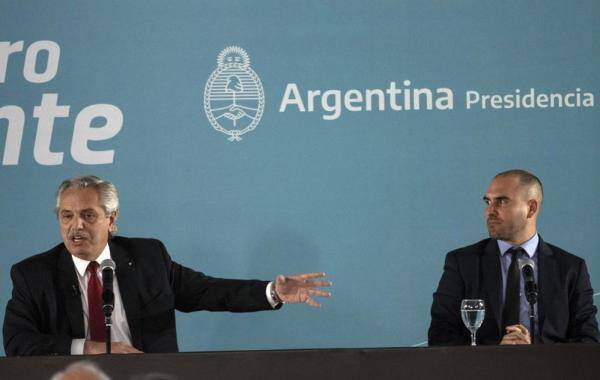Argentina’s economy minister resigned unexpectedly Saturday, dealing a fresh blow to the government of President Alberto Ferandez as the country struggles with economic problems.
Martin Guzman stepped down after a week in which Argentina’s currency hit an all-time low against the dollar amid sizzling inflation and truck drivers staged protests over shortages of diesel fuel.
No successor was immediatlely announced.
“I write to you to present my resignation as economy minister,” Guzman said in a seven-page letter addressed to Fernandez that he published on Twitter that highlighted internal battles within the administration.
Best of Express Premium
 PremiumGet inspired: Why did Sardar Patel say that civil servants must not take …
PremiumGet inspired: Why did Sardar Patel say that civil servants must not take …
 PremiumNITI Aayog-commissioned report which studied 3 orders by Supreme Court, 2…
PremiumNITI Aayog-commissioned report which studied 3 orders by Supreme Court, 2…
 PremiumInside Track: Amit Shah’s strategy for Maharashtra and Fadnavis
PremiumInside Track: Amit Shah’s strategy for Maharashtra and Fadnavis
 PremiumTavleen Singh writes: Islamism has no place in IndiaMore Premium Stories >>
PremiumTavleen Singh writes: Islamism has no place in IndiaMore Premium Stories >>
Illustrating the tensions, Guzman announced his resignation while Vice President Cristina Fernandez was giving a high-profile speech in which she lambasted the government’s economic policies. The vice president, who is not related to Argentina’s leader, is a former president herself and the governing coalition has been splintering between their allies.
The resignation came at the end of a week of economic turmoil.
With the Argentine peso sliding against the dollar, the government on Tuesday made it harder to acquire dollars to pay for imports as the local currency reached new lows in the parallel market used by citizens and companies to bypass official channels.
Argentina has suffered for years from a shortage of dollars, which stems partly from the distrust of Argentines in their own currency amid high inflation. Inflation is running at an annual rate of more than 60% and economists expect the rate to keep worsening.
Work stoppages by truck drivers have disrupted economic activity, including the delivery to ports of grain, which is one of Argentina’s main imports.
On Wednesday, the government said it was trying to increase the availability of diesel by allowing more biofuel to be mixed into the fuel and also by suspending the import tax on diesel.
Argentina produces diesel but not in sufficient quantities for its needs and depends on imports, with world prices rising because of disruptions by the pandemic and the Russian invasion of Ukraine.
Analysts say one of the reasons for the shortage is that it is not profitable for oil companies to import diesel because the government prevents them from charging what it costs to buy on the international market.
In his resignation letter, Guzman suggested that at least part of his reason for leaving was because he lacked political backing inside the government.

 Argentina’s President Alberto Fernandez, left, is accompanied by Economy Minister Martin Guzman, during an announcement in Buenos Aires, Argentina, June 6, 2022. Guzman announced his resignation on Saturday, July 2, via twitter. (AP Photo/Rodrigo Abd, File)
Argentina’s President Alberto Fernandez, left, is accompanied by Economy Minister Martin Guzman, during an announcement in Buenos Aires, Argentina, June 6, 2022. Guzman announced his resignation on Saturday, July 2, via twitter. (AP Photo/Rodrigo Abd, File)
“From the experience I’ve lived, “he wrote, “I consider it will be fundamental to work on a political agreement within the governing coalition so that the person who replaces me will have the centralized control of the necessary macroeconomic policy instruments to face the challenges ahead.” Guzman had been in his post since the start of Fernandez’s government on Dec. 10, 2019, and was long one of the most high-profile figures within the Cabinet.
Early on in the administration, he was seen as a staunch ally of the president but also someone who could help bridge divides in the often-fractious governing coalition. In recent months, however, he clashed with some officials loyal to the vice president and his influence within the government appeared to be waning.
Guzman’s first challenge in the job, and success, was negotiating a restructuring of Argentina’s debt, and avoiding a default.
He later reached a deal on debt relief with the International Monetary Fund, but some of the more left-leaning elements of the government said it included too many concessions that would hamper Argentina’s economic growth.
Lawmakers allied with the vice president voted against the agreement with the IMF in Congress and Guzman’s resignation raises doubts about whether the country will be able to meet the terms of the deal.
In his resignation letter, Guzman said that his main goal when taking the job was to “calm the economy” and in order to do that it was necessary to “resolve the problems of the unsustainable external debt that overwhelm the state, as well as all of Argentina.”
UPSC KEY Have you seen our section dedicated to helping USPC aspirants decode daily news in the context of their exams? See Here

